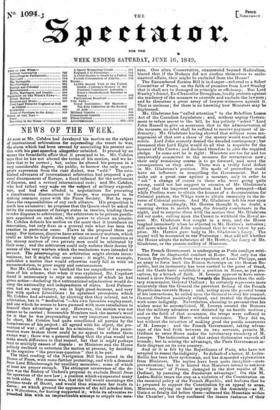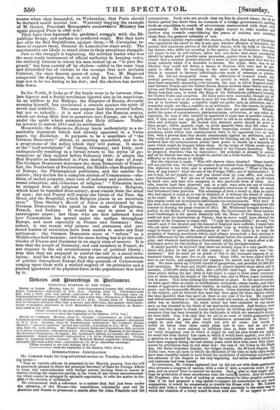The French Government is undergoing at Paris condign retri- bution
for its disgraceful conduct at Rome. Not only has the French Republic, fresh from the expulsion of Louis Philippe, sent an army to force back the Roman Sovereign on the Roman Re- public, but its insincerity has been carried to the point of fraud, and the Gauls have established a position in Rome, as yet pre- carious, by a breach of faith. M. Lesseps appears to have enter- tained a more friendly feeling towards the Romans than the mili- tary commander, General Oudinot ; he certainly represents more accurately than the General the prevalent feeling of the French Republicans towards Rome ; and, acting upon the general terms of his instructions, he called upon the General to obey his counsel. General Oudinot positively refused, and treated the diplomatist with some indignity. Nevertheless, choosing to presume that his wishes must be accomplished, M. Lesseps assured the Romans that the military advances were dictated by no hostile motives ; and on the faith of that assurance, the troops were suffered to occupy the Monte Mario without resistance. They did so, but without the intention of making good the pacific assurances of M. Lesseps : and the French Government, taking advan- tage of this bad faith between its two servants, permits M. Oudinot to enter Rome under the involuntary treachery of M. Lesseps. The indiscretion of that ardent diplomatist exceeds all bounds ; but in seizing the advantage, the Paris Government in- flicts disgrace on its own country. And so it is felt by the Republicans of Paris, who have not scrupled to resent the indignity. In default of a better, M. Ledru- Rollin has been their spokesman, and has demanded explanations from Ministers. The replies have been quite inexplicit—mere prevarication ; but it is hinted that Ministers intend to retrieve the "honour" of France, damaged in the first repulse of M. Oudinot, by pursuing the fraudulent advantage! On this M. Ledru-Rollin treats the step as a violation of the Constitution on the essential policy of the French Republic, and declares that he is prepared to support the Constitution by an appeal to arms. Ministers, relying on their majority in the Assembly—as M. Guizot so fatally did before them—silenced the Mountain within the Chamber ; but they confessed the insane rashness of their
coarse when they demanded, on Wednesday, that Paris should be declared under martial law. Wantonly copying the example of M. Guizot, President Bonaparte's conservative Ministry has again plunged Paris in civil war !
They have thus hastened the predicted struggle with the Re- publique Rouge, and perhaps its predicted reign. But they have not only the Red Republicans against them,—M. Cavaignac re- fuses to support them, General de Lamoriciere stays away. The reactionaries are likely to stand alone in their precarious struggle.
Just as the struggle is beginning, the military leader who was the most ready instrument of official authority in keeping order, the soldierly veteran to whom his men looked up as "le pere Bu- geaud," has been carried off by cholera—added to the same long and diversified list of victims to the scourge that now includes Catalani, the once famous queen of song. Yes; M. Bugeaud conquered the Algerines, but in evil day he braved the warn- ings not to be too daring in his diet; and the cholera has mowed him down.



























 Previous page
Previous page